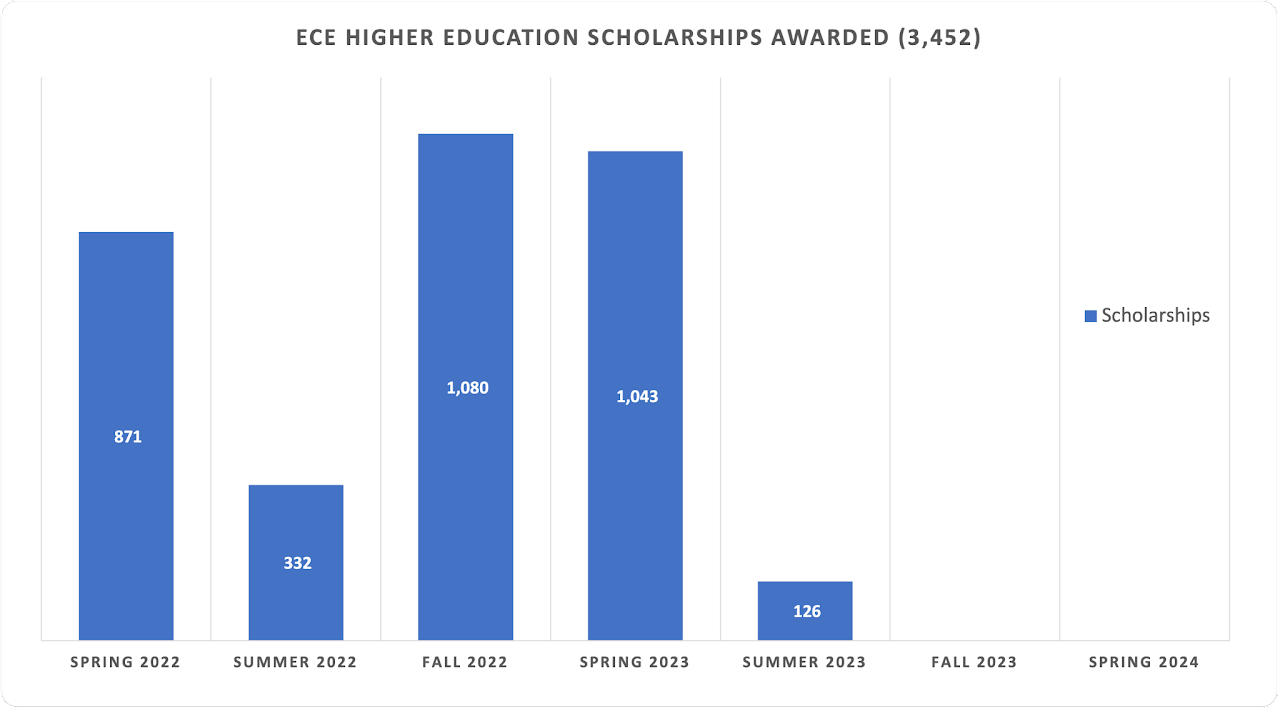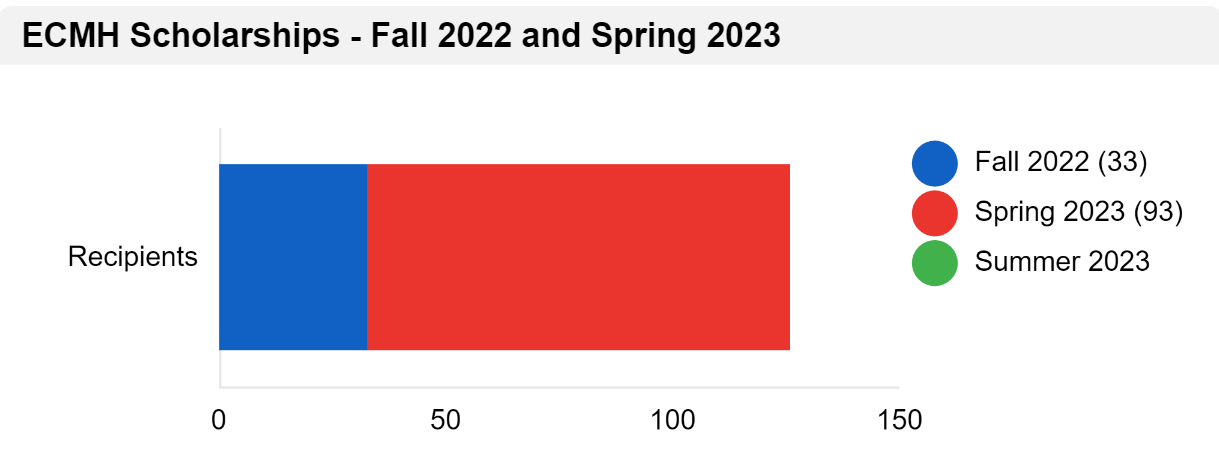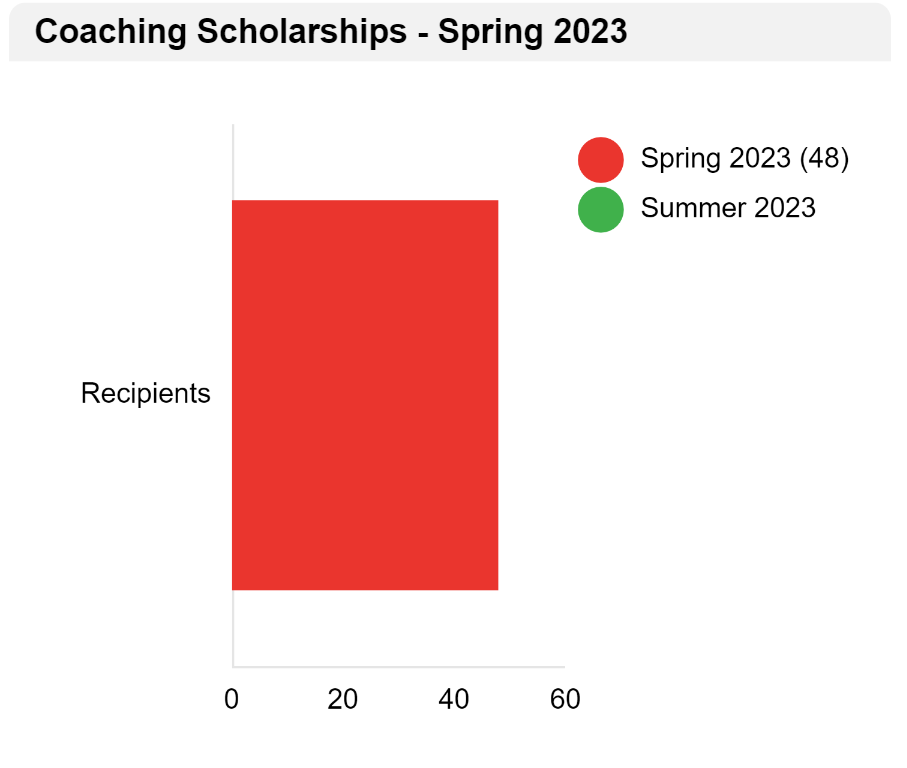Workforce Recruitment and Retention
The Need
Demand for early childhood educators and directors is expected to increase by nearly 25% percent over the next ten years, especially in rural communities. The pandemic led to a 7% decrease in Colorado’s early childhood workforce between spring of 2020 and fall of 2021. Prior to statewide shutdowns, a 4% increase was expected during this period, thus creating an 11% gap in where we expected our workforce growth to be in fall of 2021.
The Strategy
The Workforce Recruitment and Retention Scholarship Programs offer professionals a menu of options for financial assistance to pursue the education and training needed to enter and advance in the early childhood workforce.
CDEC is taking a comprehensive approach to supporting the early childhood workforce through this strategy, including:
- providing higher education scholarships through 22 public colleges and universities to help professionals obtain higher education certificates and degrees,
- providing student loan repayment assistance to teachers as an innovative compensation strategy to reduce student loan debt burden,
- partnering with institutes of higher education to create Prior Learning Assessment and Credit for Prior Learning opportunities so that early childhood professionals can receive college credit for qualified training and professional experience,
- increasing the number of credentialed early childhood coaches to support retention of early childhood teachers and directors,
- increasing the number of Early Childhood Mental Health Consultants to provide mental health consultation to early childhood professionals and families,
- increasing participation in the Expanding Quality in Infant and Toddler Care Initiative to better support infant and toddler care professionals, and
- creating a Comprehensive Early Childhood Workforce Plan for CDEC and its partners to strategize continued support for the early childhood workforce.
Additionally, some of these funds bolstered budgets for existing strategies, such as apprenticeships and other scholarship opportunities.
The State and Local Federal Recovery Funds (SLFRF) funding authorized by SB22-213: Child Care Support Programs includes over $8 million for the early childhood workforce and over $4 million designated to support Early Childhood Mental Health Consultants, Early Intervention professionals, and home visitors.
From fall of 2021 through spring of 2022, the Office of Early Childhood (prior to the transition to CDEC) began launching recovery programs utilizing Coronavirus Response and Relief Supplemental Appropriations (CRRSA) and American Rescue Plan (ARP) Act funding to support the growth and retention of the early childhood workforce.
Key Outcomes and Learnings
CDEC is observing slow regrowth of the workforce after losing nearly 7% of professionals by fall 2021, compared to pre-pandemic figures. Our workforce is approaching 24,500 professionals after dropping down to approximately 21,400 during the pandemic. This growth over the last few years is very encouraging and supportive of all of the recruitment and retention initiatives (including the T.E.A.C.H. Early Childhood Scholarship, apprenticeships, CDA scholarships and all workforce strategies).
As of fall 2022, 2,175 Recruitment and Retention Scholarships had been distributed. These scholarships focus more on retention of existing students, versus recruitment of new students to the field. Hiring staff to support implementation vendors has been a challenge. When staff have been hired, participation in scholarship and loan forgiveness strategies has grown.
Demand for these strategies is high, and colleges and universities have been able to support over 4,000 enrollments with scholarship funding.
In the first two rounds of loan forgiveness, over 2,800 ECE professionals holding a total of $50 million in student loan debt applied for awards. In partnership with the Colorado Department of Higher Education (CDHE), CDEC has been able to provide $5,000 awards to 300 individuals totaling $1.5 million; however, professionals in the ECE field still hold a significant amount of student loan debt, which may drive educators to higher-paying jobs in other industries.

Funding
Amount: $31,290,613
Sources:
- American Rescue Plan (ARP) Discretionary
- State and Local Federal Recovery Funds (SLFRF)
- Coronavirus Response and Relief Supplemental Appropriations (CRRSA)
- Child Care and Development Fund (CCDF)
Expiration:
- ARP funding expires on September 30, 2024
- SLFRF funding expires December 30, 2026
Next Steps
CDEC is working on extending many existing programs funded by CRRSA and ARP through SLFRF funding appropriated in SB22-213. Announcements on which projects will be funded and how that affects their implementation timeline will be coming soon.
Evidence Brief
"Recruitment and Retention Scholarship Program and Free 1011 and 1031 Coursework"
Butler Institute for Families, University of Denver
(September 2023)
Additional Data

Loan Forgiveness
Recipients receive $5,000 in direct loan payments made across 12 months.
- FY23 Awarded: 300 professionals (34 ECMH Consultants and 266 early childhood teachers)
- FY24 Expected Awards: 100 professionals to be selected in September 2023



